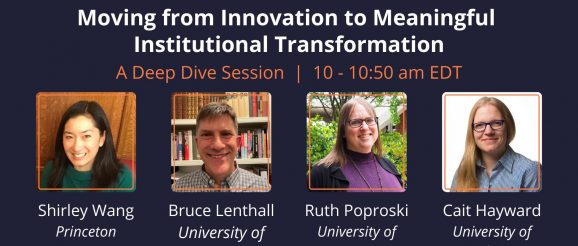Symposium Spotlights: How Higher Ed Institutions Moved from Innovation to Transformation – Duke Learning Innovation

Duke Learning Innovation co-hosted the 2022 Pandemic Pedagogy Research Symposium on May 11, alongside institutional partners: the Center for Academic Innovation at the University of Michigan, Penn’s Online Learning Initiative, Princeton’s McGraw Center for Teaching and Learning, Stanford Digital Education, University of Georgia’s Center for Teaching and Learning and the Friday Institute for Educational Innovation at NC State University. The symposium, which was free to all participants, featured research presentations, lighting talks and panel discussions. Participant research focused on transformations that emerged from the chaos of the pandemic.
As part of a deep dive session Moving from Innovation to Meaningful Institutional Transformation, presenters from four of our partner institutions — Princeton University, the University of Pennsylvania, the University of Georgia (UGA) and the University of Michigan — shared their experiences with how teaching and learning has changed.
In the University of Michigan’s presentation, Deb Meizlish, Senior Assistant Director for the
Center for Research on Learning and Teaching, provided a framework not just for her presentation but the whole of the session.
“What are you holding on to? And what are you letting go of? … We found [these questions] to be fruitful ways to open conversations about the teaching and learning lessons from this pandemic moment,” Meizlish said.
While Princeton, Penn, UGA and Michigan have institutional differences that shape their innovation strategies, throughout the four presentations and the lively discussion that followed, common threads of transformation emerged.
Engaging the University Community
Across the board, the presenters of this session discussed how their centers for teaching and learning and campus partners worked to engage their communities in their initiatives.
Given the turbulence of the pandemic era, Meizlish noted that there has been a focus on asking where do we go from here?
“We’re asking questions about what we need to prepare people for and what evidence we need to select different approaches … we’ve been intentional about listening to the community,” said Caitlin Hayward, Associate Director, Research & Development at Michigan’s Center for Academic Innovation.
Shirley Wang, Senior Associate Director for the McGraw Center for Teaching and Learning at Princeton, focused her presentation on how Princeton is working on initiatives on faculty teaching. For instance, Princeton will be piloting a Hybrid Course Design Institute this summer that will include asynchronous and synchronous online engagement, aimed at faculty redesigning their courses.
“We’ve done a lot of reflection … over the last year and the last couple of years,” Wang said. “Some of the challenges we see in terms of having faculty engage with teaching or teaching-related initiatives seems to be about sort of bandwidth and also just engagement.”
Ruth Poproski, Assistant Director of Faculty Teaching and Learning Initiatives for the Center for Teaching and Learning at UGA, spoke about an AirTable tool called S.A.L.T. (Selecting Your Active Learning Techniques). This tool, Poproski noted, emerged from working with faculty and students. Poproski expects the crowdsourced-tool’s repository will expand, noting other institutions are already using it. Poproski also shared that a major Quality Enhancement plan for UGA’s undergraduate education is centered on active learning.
Building Meaningful Learning Experiences
Bruce Lenthall, Executive Director of Penn’s Center for Teaching and Learning emphasized in his presentation the importance of community to student learning. Throughout institutional surveys that explored how online courses were going, as well as focus groups, it became clear that building instructor-student and peer relationships made learning “meaningful.”
“Learning from and with one another, building community, isn’t just a bonus, it’s not just an add-on, it is at the core of the experience,” Lenthall said.
During the discussion portion of the session, audience members asked about how to avoid giving students cognitive overload by introducing too much technology.
Wang offered the possibility that instructors consider, “potentially deemphasizing the technology itself and being really thoughtful about the pedagogy, so it’s the technology [that] enhances the pedagogy,” but technology doesn’t drive the classroom.
Defining Flexibility
In both presentations and the question and answer session, the term “flexibility” ignited discussion both about how courses adapted to support students and how the term, when used without institutional guidance, could provoke uncertainty.
Lenthall said during his presentation, “Flexibility wasn’t enough, we also needed a high degree of structure for our students … Structure and flexibility are not in fact oppositional as they’re so often cast, but they [reinforce] one another, and if we value compassionate teaching it requires both.”
When noting that Michigan used technology to respond to the needs of the pandemic, Hayward highlighted tools such as the learning management system Gradecraft, whose functions encourage instructors to design flexible courses from the get-go.
Multiple members of the audience noted that while they wanted to support students, not every institution made it clear how to accommodate students during the pandemic. The ad-hoc approach instructors had to take made it difficult to accommodate students equally and, at times, created burdens for those teaching in an already difficult time.
In response to this, Poproski said that flexibility “needs a little more investigation” to balance student and instructor needs.
“Flexibility tends to come with a lot of extra work. And so what are the ways we can do it efficiently and effectively that also help the students see that they are being cared for, their interests are being taken into account?” Poproski asked.
Learn More
If you registered for the 2022 PPRS, you can access recordings of the sessions until August 15, 2022.
Interested in redesigning your course based on the ideas shared from this blog post? You can contact Learning Innovation at [email protected] to set up a consultation.
